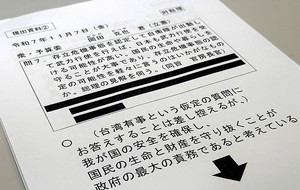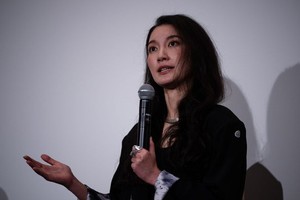THE ASAHI SHIMBUN
December 23, 2024 at 17:01 JST
Emperor Emeritus Akihito, who turned 91 on Dec. 23, continues leading a calm and regular daily life, according to the Imperial Household Agency.
Akihito has been caring for Empress Emerita Michiko, who is still recovering from a broken leg.
The agency also noted that Akihito continues to stay up to date on events within Japan and abroad.
On his birthday, Akihito is scheduled to receive congratulations from Emperor Naruhito and Empress Masako, Princess Aiko, Crown Prince Fumihito and his family.
Other members of the imperial family, and the heads of the three branches of the Japanese government, are also scheduled to celebrate his birthday.
On Dec. 23, the agency described how Akihito has been spending his days recently.
Akihito reads the newspaper in the morning and evening, and keeps an eye on social events and trends through news reports, books and conversations with his chamberlain. He watches TV news at mealtimes, partly to refrain from conversations to prevent aspiration.
This year, in particular, he is concerned about the situation in the Noto Peninsula, which was hit by a massive earthquake on New Year’s Day and torrential rains in September, and the lives of the victims in the area.
In May, he visited Nikko, Tochigi Prefecture, as part of a trip to revisit places he had evacuated to during World War II.
At the former Nikko Tamozawa Imperial Villa, where he spent more than a year toward the end of the war, he told Michiko about his life at that time and saw the remnants of an air-raid shelter in the garden.
Akihito’s daily life is still deeply connected to his memories of the war.
He once said, “There are four days that must be remembered.”
He still offers silent prayers on Okinawa Memorial Day, the anniversaries of the atomic bombings of Hiroshima and Nagasaki and the anniversary of the day World War II ended.
He also watches documentaries about the war around the anniversary of its end.
In particular, he has often mentioned his feelings toward Okinawa, where the largest ground battle in Japan took place, saying. “I think it is important that all Japanese people share the misfortunes suffered by the Okinawan residents in the war.”
He reads a book aloud with Michiko every day, and he is currently reading “Senso to Okinawa” (the war and Okinawa) by the late Shui Ikemiyagusuku.
Ikemiyagusuku was the president of the Okinawan newspaper Ryukyu Shimpo, and also served in the military in the ground battle during the U.S. invasion of Okinawa in 1945.
Akihito continues his life’s work of doing research on the classification of gobiidae fish, spending two days a week at the biology research lab within the Imperial Palace.
He is currently working on two main projects: re-examining the classification and ecology of the dusky tripletooth goby based on past papers, and re-examining the taxonomy of the Japanese dusky frillgoby.
There have been no major changes in his health. He was diagnosed with right heart failure due to a tricuspid valve obstruction in July 2022, which is still present.
Akihito’s BNP level, a diagnostic indicator of heart failure, is slightly higher than the normal range and a small amount of pleural effusion is also present.
However, Akihito has kept his condition stable by taking medications and restricting his fluid intake.
Meanwhile, Michiko has recovered to the point where she can walk without using a cane after breaking her right leg in October. They often enjoy taking walks together.
(This article was written by Ryuichi Kitano, senior staff writer, and Ayako Nakada.)




















A peek through the music industry’s curtain at the producers who harnessed social media to help their idols go global.
A series based on diplomatic documents declassified by Japan’s Foreign Ministry
Here is a collection of first-hand accounts by “hibakusha” atomic bomb survivors.
Cooking experts, chefs and others involved in the field of food introduce their special recipes intertwined with their paths in life.
A series about Japanese-Americans and their memories of World War II